Battle of Western gates of Donbas: Life in frontline city of Pokrovsk
 Evacuation from Pokrovsk (photo: Yevhen Semeniuk/RBC-Ukraine)
Evacuation from Pokrovsk (photo: Yevhen Semeniuk/RBC-Ukraine)
After occupying Avdiivka, Russia set out to capture Pokrovsk. Most of the Russian army's forces are concentrated in this area. The Russian troops storm Ukrainian positions every day, trying to shift the front line. RBC-Ukraine's report describes how the town near the most difficult section of the frontline is living now.
The city of Pokrovsk in the Donetsk region is called the "Western gates of Donbas". Before the Russian invasion, more than 80 thousand people lived here. But due to the danger of the approaching front, the number of residents is steadily decreasing. So is the distance to the contact line, which is now about 20 kilometers away. The Russians are slowly but steadily advancing. Pokrovsk is currently Russia's number one target, as President Volodymyr Zelenskyy stated the day before.
In recent weeks, Russian troops have managed to advance on several flanks of the Pokrovsk direction. The biggest breakthrough was made near the villages of Prohres and Vovche, which are already under Russian occupation. The Russian army is now trying to reach Hrodivka, which is likely to allow the Russians to take Pokrovsk itself under artillery fire.
Entering the city, one might initially get the impression that the war has not affected it much. Utilities start the morning in the usual rhythm, mowing lawns and removing garbage. Neat flower beds with roses are planted almost everywhere. People are trying to live their normal lives as much as possible. Grocery stores are open in the city, hospitals and beauty salons are open, as well as several supermarkets, cafes, restaurants, and shopping centers. But after 7 p.m., Pokrovsk is empty - the curfew starts at 9 p.m.
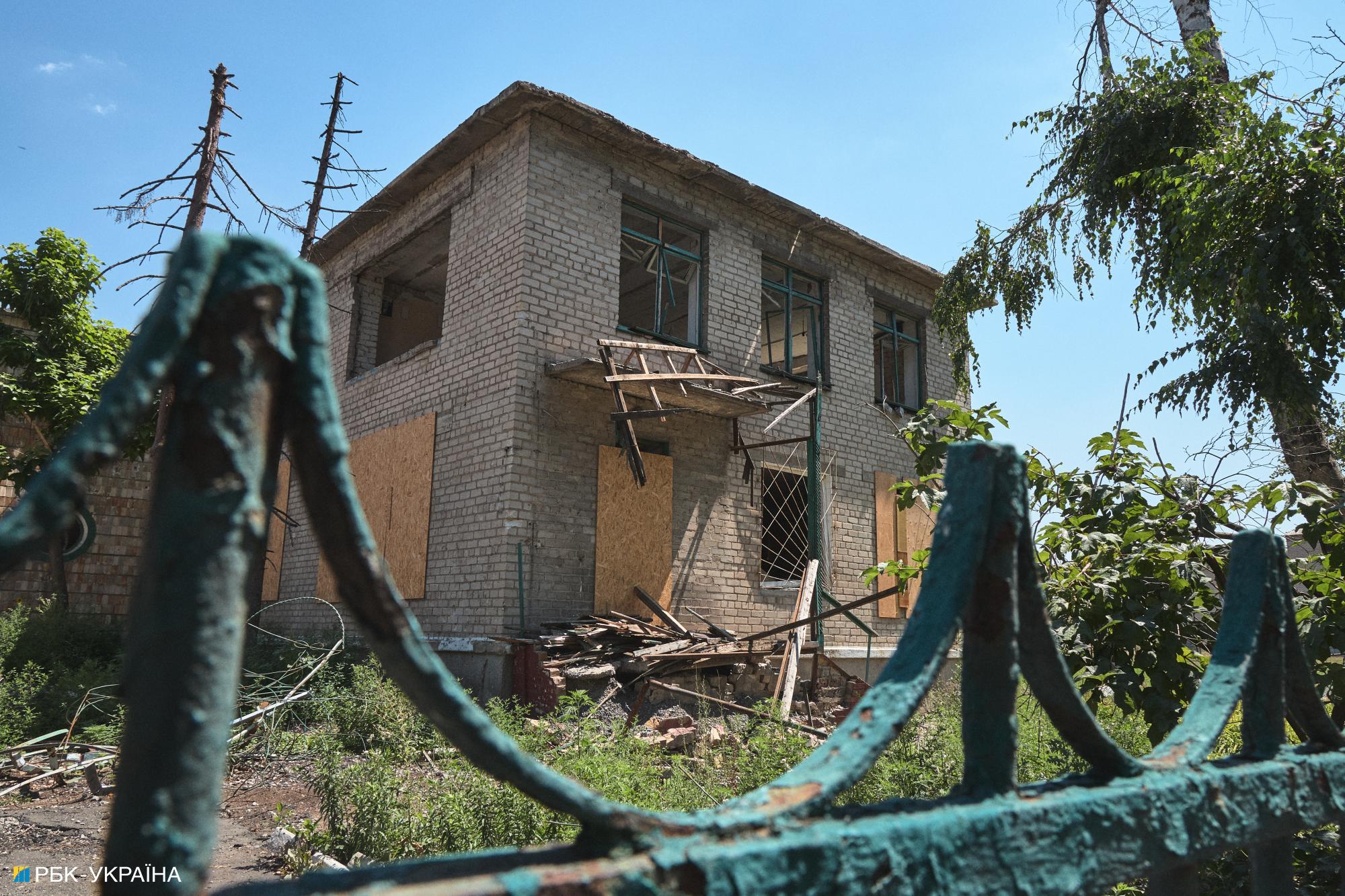 Photo: RBC-Ukraine
Photo: RBC-Ukraine
The feeling of calm upon arrival does not last long, as explosions interfere with the usual rhythm of people. From here, the sounds of guided aerial bombs used by the Russians to bombard the front line, are constantly heard. The locals are already quite calm about the explosions, sometimes even phlegmatic, and can stop for a moment, stand, and continue their business.
A shop assistant stops with a sigh when she hears a roar in the sky.
"Is it a rocket again? At least not here," she says
As soon as the sound disappears, the woman continues to punch through the goods with relief. Pokrovsk residents seem to half-jokingly sometimes call themselves almost homeless, realizing that each subsequent air strike could leave them homeless.
"Today we have a home, and tomorrow it may be lost," one of the locals says.
During the war, Russia has fired over 80 times at Pokrovsk, only 31 times this year. The Russians are firing with S-300 and Iskander missiles. In recent months, the city has been hit by Smerch and Tornado MLRS, says Serhii Dobriak, head of the Pokrovsk military administration.
Despite everything, Pokrovsk is holding on. Moreover, it is here that the only maternity hospital in the entire Donetsk region continues to operate, where 3-4 children are born every week. A new intensive care unit for premature babies has recently been opened.
When asked whether there is an evacuation plan in place in case the front line approaches, the head of Pokrovsk confidently replies that transportation lines have been developed and agreements have been reached with cities in safer areas.
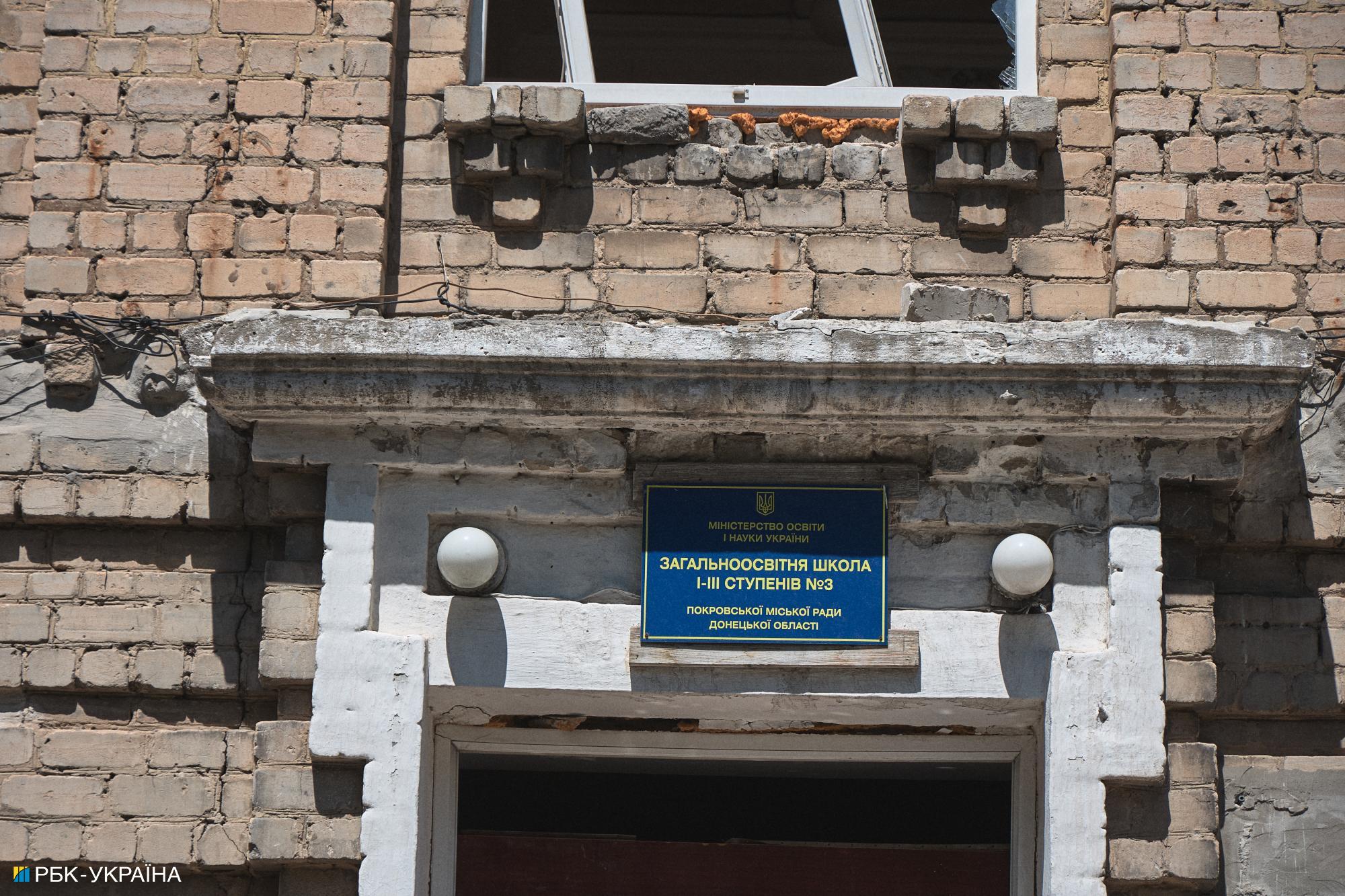 Photo: RBC-Ukraine
Photo: RBC-Ukraine
Despite the risks, as in many other frontline cities, people are in no hurry to leave their homes. Some have nowhere to go, others are trying to stay at home as long as possible. According to Serhii Dobriak, at the beginning of the full-scale Russian invasion, half of the population left for safer areas, and then some people returned. While there were about 30,000 locals left in Pokrovsk immediately after the Russian invasion, now more than 60,000 people are living here, and before the big war there were 86,000.
Central Square and Donbas Shchedryk
Pokrovsk's Central Square is home to educational institutions and a house of culture. After the Russians occupied part of the Donetsk region, the Donetsk National Technical University was moved here and housed in a majestic building with a golden inscription. But students cannot study here anymore - the building was half destroyed after the Russians hit it with S-300 missiles last winter.
"I remember that day. It was at the end of February. Russia struck with 4 ballistic missiles. It was very loud, very dangerous. We immediately arrived at the scene and saw this large-scale destruction. The entire central boulevard was affected by the shock wave. You see, Russia doesn't stop. Russians destroy everything," recalls Viacheslav Petrovskyi, an officer of the Civil-Military Cooperation of the Ukrainian Defense Forces.
The building is beyond repair, and there are also ruined houses around it, with black marks from fire on the high-rise buildings. Most of the apartments in the buildings have no windows for a long time, and people have installed plywood sheets instead. There is no point in replacing double-glazed windows because of the constant Russian shelling, not to mention the risk of getting injured by glass fragments.
Opposite the university, there is a symbolic monument to young Taras Shevchenko, who survived despite the constant shelling and destruction around him. The outstanding Ukrainian poet seems to be challenging the Russians, who are destroying houses and cannot overcome the spirit of Ukrainian resistance.
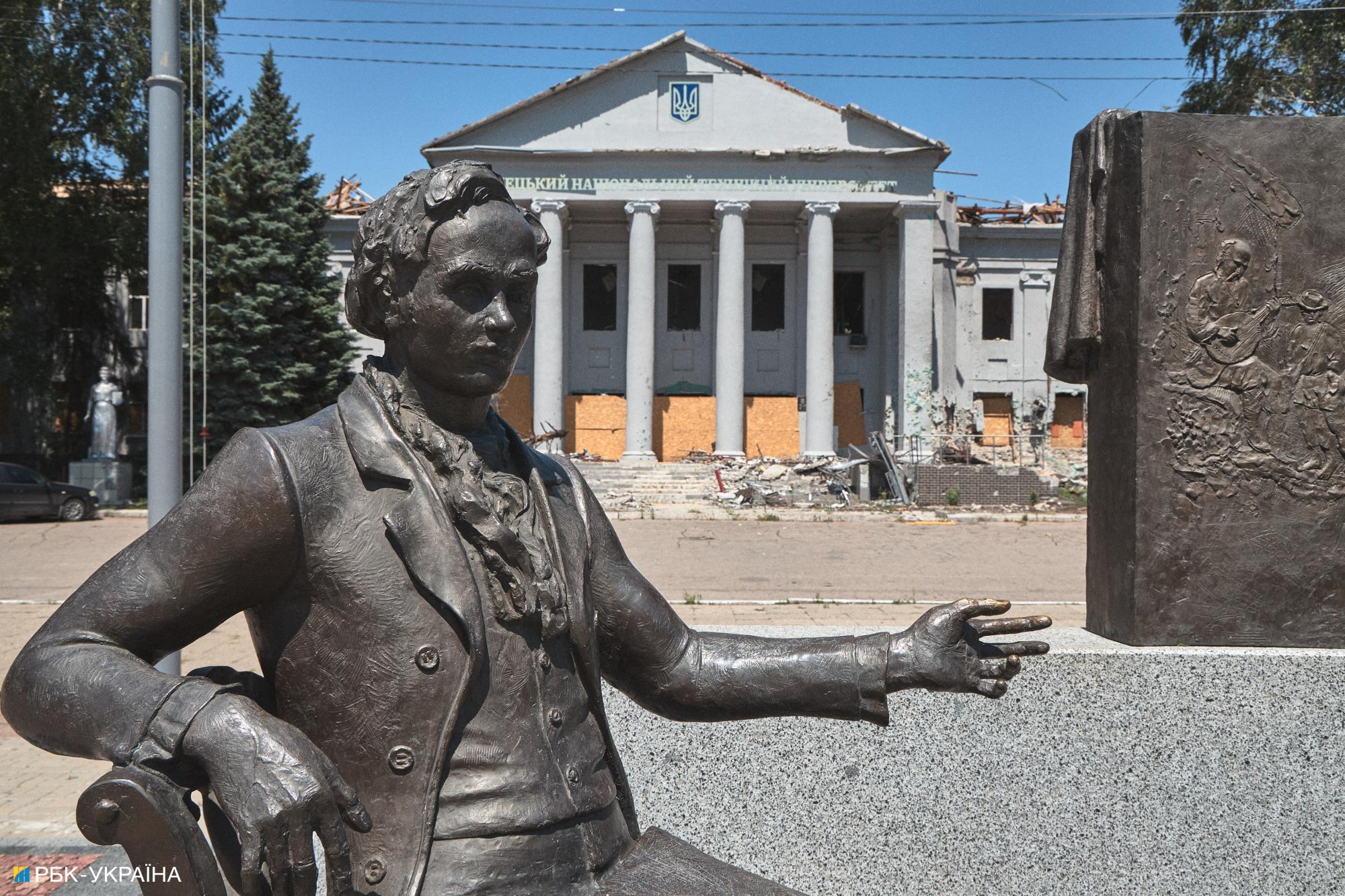 Photo: RBC-Ukraine
Photo: RBC-Ukraine
Not far from Shevchenko, there is another building that almost completely burned down after the Russian shelling, leaving only the facade. It is decorated with a stand with the inscription "Shchedryk was born here". Mykola Leontovych's world-famous song was composed here. From 1904 to 1908, the Ukrainian composer and folklorist lived in the village of Hryshyne, which is now called Pokrovsk.
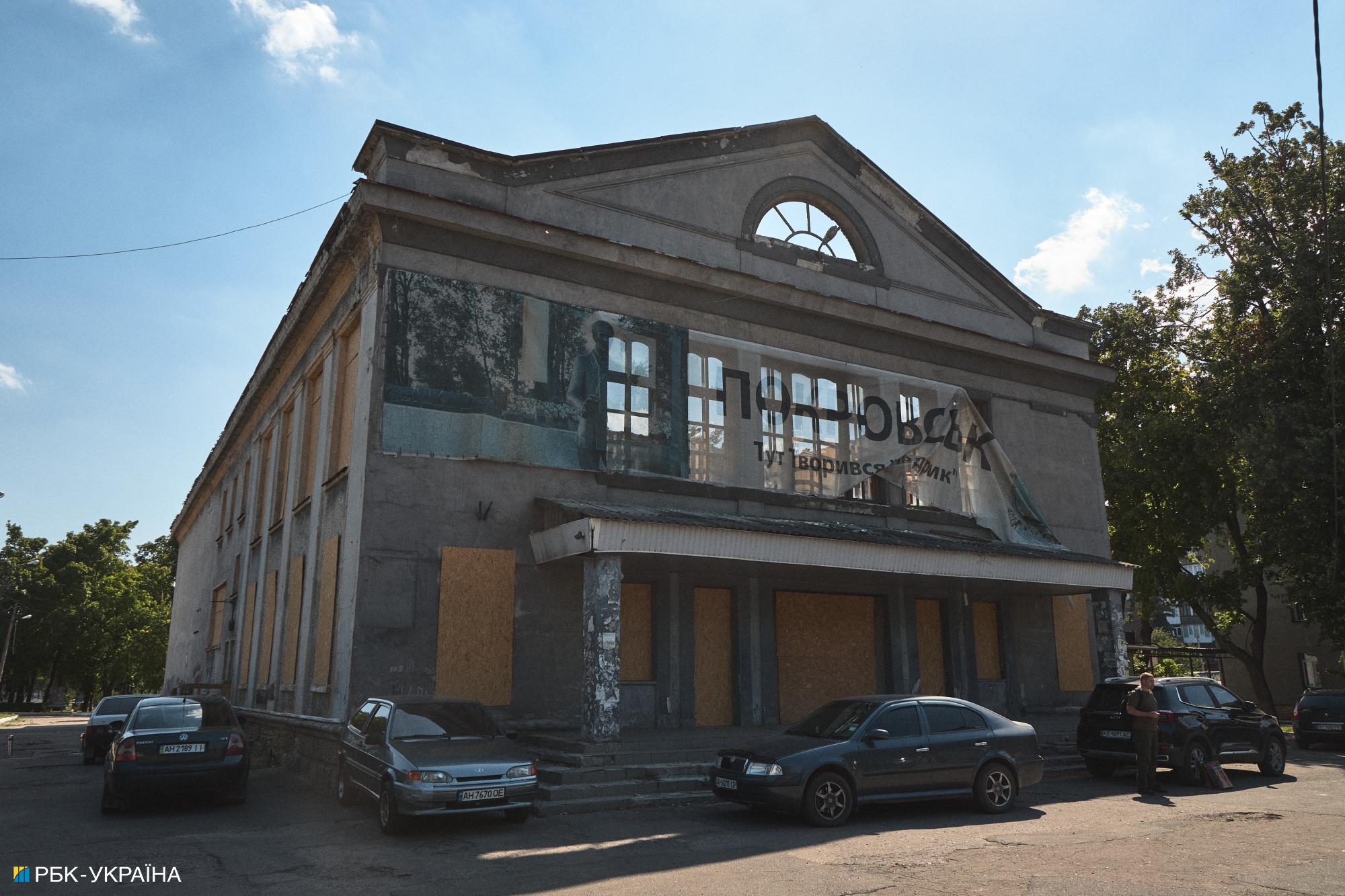 Photo: RBC-Ukraine
Photo: RBC-Ukraine
Russia's guided aerial bombs
There are still quite a few children in Pokrovsk, but there is nowhere for either schoolchildren or preschoolers to study. Not far from the center, there is a school that was also hit by a Russian rocket. A map of Ukraine and a blue and yellow flag can be seen from the smashed windows on the third floor. The signboard with the name of the school No. 3 also remains.
The cleanliness of the ruins causes a strange dissonance. After the Russian shell hit, the utility workers came here and immediately took everything down and cleaned the area. Despite the damage, there is still a strange feeling of some kind of comfort in the courtyard of the destroyed school.
There are many destroyed buildings in Pokrovsk and their number is growing. Not far from the school, another sad picture opens up. About a month ago, the Russians hit a kindergarten. It left a pile of stones from the walls in the middle of the playground with swings, scattered papers, and furniture.
The destroyed wall exposed one of the classrooms, where miraculously icons remained hanging on two opposite walls, and roses sprouted in the pile of stones on either side. The children had not been there for a long time, but the picture itself makes you sad to realize who Ukrainians have to fight. Russian forces do not hesitate to hit civilian objects, even those where children and young people could be.
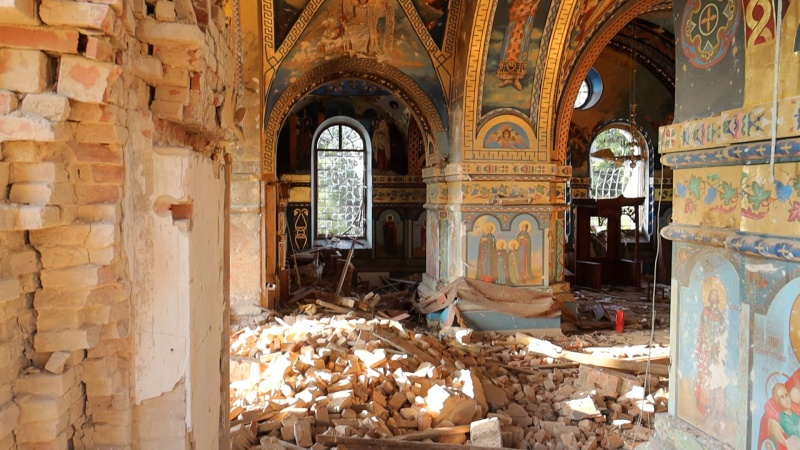
Photo: RBC-Ukraine
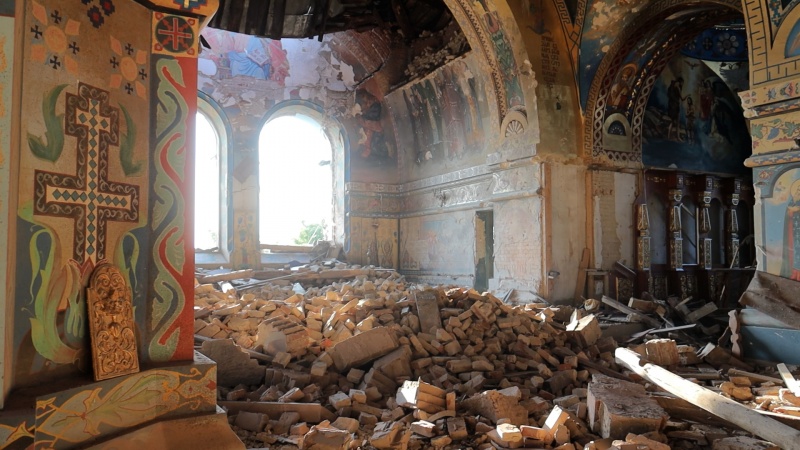
Photo: RBC-Ukraine
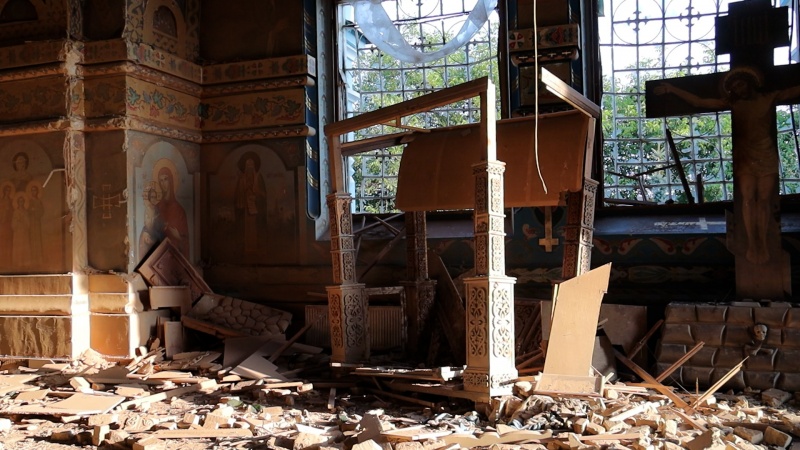
Photo: RBC-Ukraine
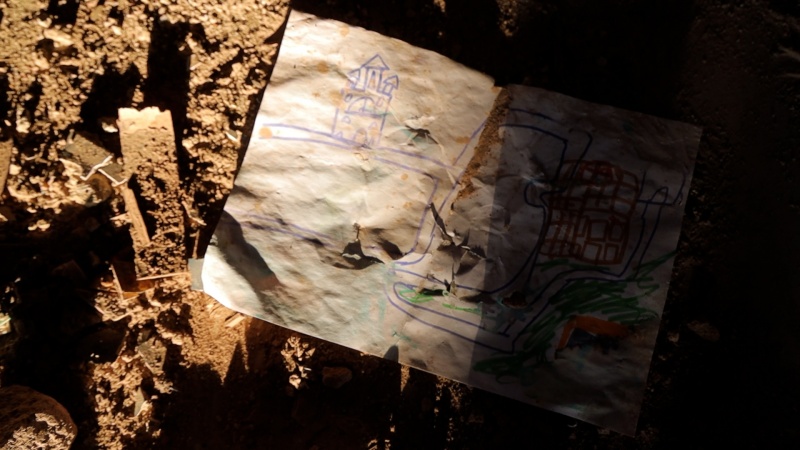
Photo: RBC-Ukraine

Photo: RBC-Ukraine
The Russians hit religious buildings. In the suburbs of Pokrovsk, the Russians hit a local church with a guided aerial bomb and later hit the post office building nearby.
We managed to enter the church not through the door, but by making our way through the brick piles of one of the walls. On the floor are drawings of children to the military of the Armed Forces of Ukraine, which cover the remains of glass and decoration. On the ceiling, a fresco of Jesus is cracked from a strong impact, icons are mangled, and a cross is covered with sand from the walls. Instead of singing prayers, there is complete silence, the crunch of glass underfoot, and the barking of a dog that continues to guard the church grounds out of habit.
Evacuation: Difficult road to a new home
Pokrovsk remains an important point in the Donetsk region where people are brought from the surrounding communities and evacuated to safer cities in Ukraine. Evacuations continue every day, especially from villages and towns where the enemy is beginning to approach.
The evacuees are brought to a shelter where they can temporarily live until they are taken further. So far, most people have been evacuated from Toretsk, Selydove, and Ukrainka towns. The situation in these settlements is quite difficult due to active Russian fire. However, not everyone agrees to leave, some do not want to leave their homes, while others are waiting until it becomes unbearable, and then they say they will leave.
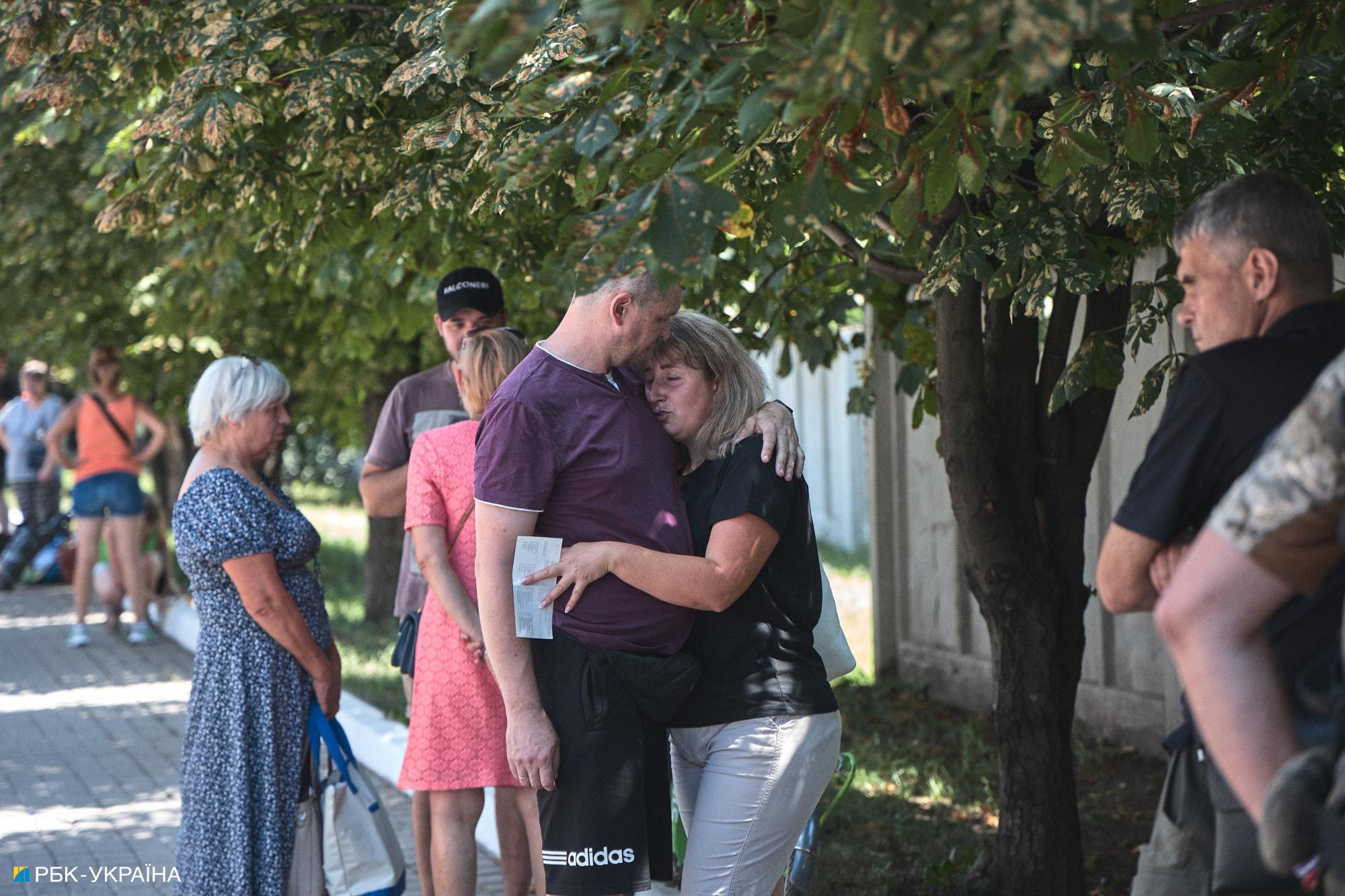 Photo: RBC-Ukraine
Photo: RBC-Ukraine
"We take people from all over the Donetsk region, especially from the frontline towns and villages. So far, it is possible to go there. The situation there is quite difficult. We are seeing a lot more destruction than before. But there are also a lot of civilians on the streets. And we offer everyone to leave. But they say they will wait for now. Everyone is holding on to their homes, their homeland, and what they have gained," says the evacuation worker.
It is most painful to see the almost destroyed villages, where there is still a surviving house nearby, and another one is an empty black spot after a KAB strike and light smoke from a smoldering fire. Children are running and playing nearby, as their parents have not yet taken them out. Local services are trying to work with these families every day to get them to move to safer places.
During the evacuation, the last point before the journey to a new life is the railway station, which the Russians are trying to destroy. The railroad continues to operate, and the atmosphere here is quite mixed. An older couple stands near the platform, saying goodbye to each other with tears in their eyes. Children with toy guns are running merrily along the tracks - it's a new and exciting journey for them, and they don't realize that they are leaving their homes. An elderly woman is standing near the train, having come to see her neighbor off and help her with her belongings. The women hug and cry, promising each other to meet again.
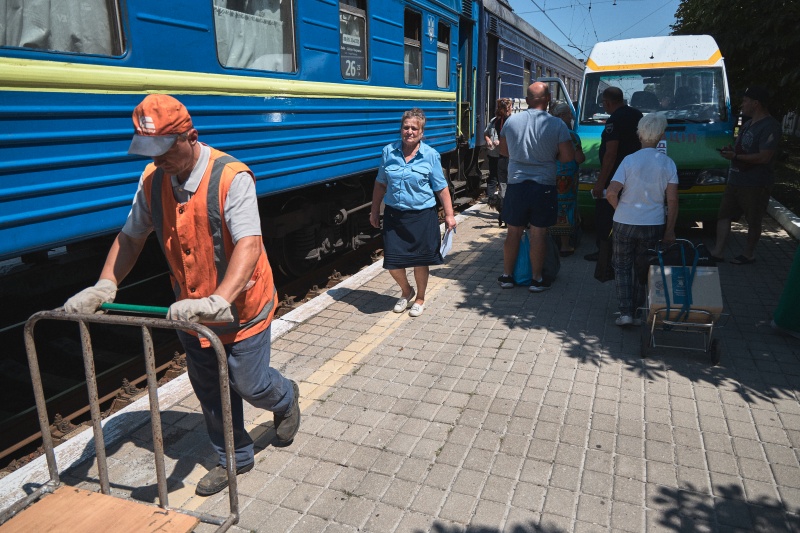
Photo: RBC-Ukraine
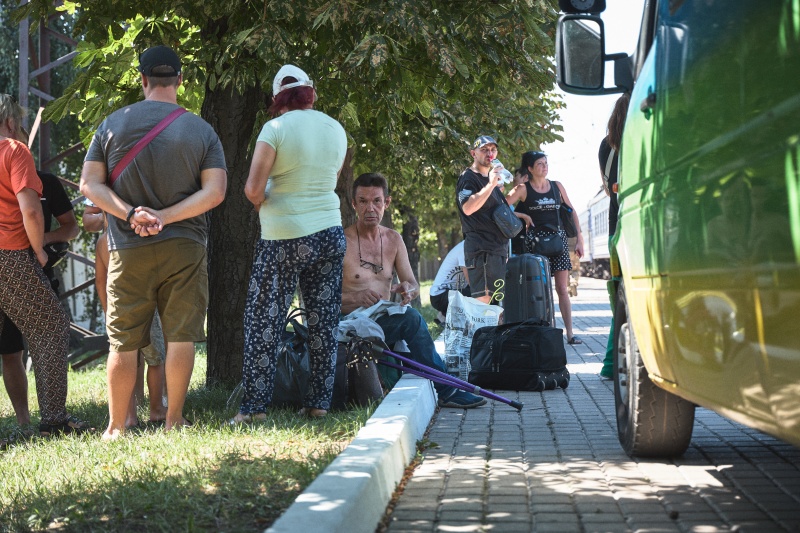
Photo: RBC-Ukraine
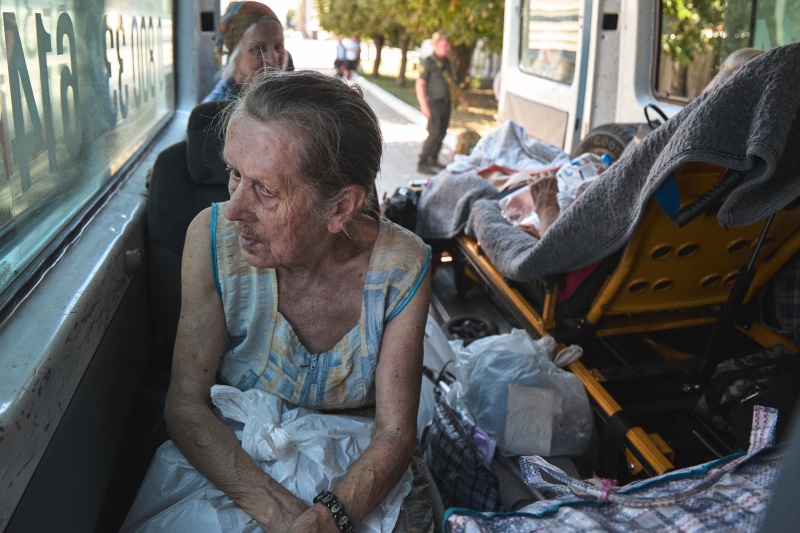
Photo: RBC-Ukraine
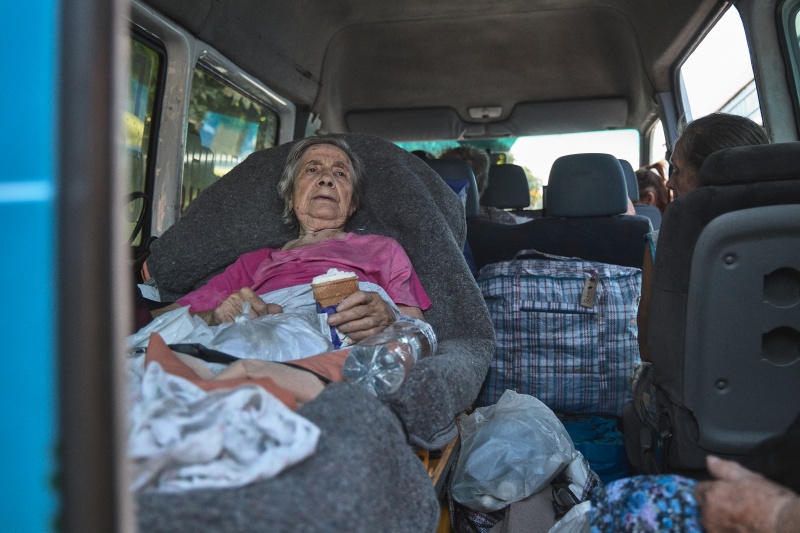
Photo: RBC-Ukraine
An evacuation vehicle with residents from the surrounding towns pulls onto the platform. Today they managed to evacuate several elderly women from Ukrainka and an old man from Toretsk. Employees of the service say that one of the women was hit by a Russia's guided aerial bomb, her house was destroyed and she suffered a concussion.
"It is very scary there. They (Russian troops - ed.) are striking all the time!" says the frightened elderly woman.
And the elderly man had to be pulled out of the rubble in Toretsk. He had no belongings left, not even documents. The man asked several times to return for documents and belongings because he could not believe that his house was destroyed.
The people being taken away have almost nothing left. They leave with small bags of belongings, but they do not forget to take their most valuable possessions - their pets. Another woman who was evacuated today took her cat with her. She is from Ukrainsk and has lived there all her life, 54 years. She says it has been very difficult to stay there in recent months.
"There is no electricity, no water, no social workers. But we survived somehow. We cooked on gas cylinders and got water from a well. There is no glass in the houses either. Yesterday, where I live, Russia's guided aerial struck. There are no relatives left there, everyone has left, and I am left alone, but I have neighbors. Now we are going to Dnipro, and I don't know where to go next. But I dream of returning after the war ends," Natalia says.
After everything we have seen and heard, the day ends with a quiet walk around the city. When you see how people try to live a peaceful life despite the military realities, you sincerely want to believe that Russia will not set foot in this cozy city of Donbas. But the city stretches along the hottest frontline, and the Ukrainian Armed Forces are doing everything they can to prevent Pokrovsk from turning into Avdiivka or Bakhmut. And judging by the number of people who stay in the city, faith in the Ukrainian military is stronger than fear of Russian occupation.

